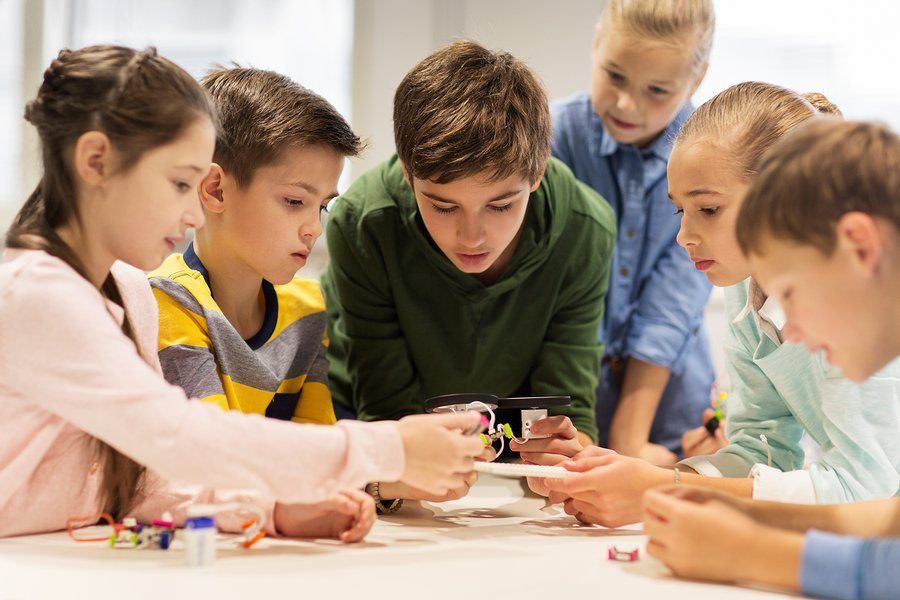Science is most often associated with a brand of boredom, which is why you probably hear children groan the minute it’s brought up as a subject of learning. But the truth is that science is one of the most interesting concepts known to mankind, and there are ways to make it amazingly interesting for kids to enjoy – provided you follow the right methods. Make science a fun topic for kids to enjoy by emboldening their natural curiosity and teaching them how to search for answers on their own. Follow these ways to make science a fun topic for children.
Create Fizzy Drama
Kids are attracted to visual marvels, so instead of explaining what makes something fizz – demonstrate it in person. It’s a well-known fact that visual appeal stays in a person’s mind far longer than mere spoken or written words. Kids will remember an actual demonstration for far longer, so here’s what you can do:
- Conduct chemistry demos with colourful reactions that trigger excited discussions in the classroom.
- Go well beyond vinegar and baking soda mixtures, and look at ways to draw visual appeal for children.
- Encourage kids to participate for themselves in the experiment so that their inquisitiveness is nourished for the purpose of education.
This way, children will be naturally curious about how things mix together and will find science far more interesting than just sitting through a dull lecture.
Demonstrate With Real-World Examples How Simple Physics Principles Work
Physics? Yawn! That’s what most people think when physics comes to mind, but you can make it much more interesting by simple demonstrations.
- Undertake classroom projects showcasing how specific inventions work.
- Demonstrate the principles of physics using simple everyday items – like building bridges out of ice cream sticks or creating structures from empty water bottles.
- Put scientific concepts into practical terms so that kids are able to grasp them more easily without having to necessarily use the scientific jargon always.
At the end of the day, kids need to find something interesting to stay motivated, especially when it comes to subjects like maths and science. Find real-world ways to show kids how simple principles of physics works and you’ll see a noticeable difference in the way they are able to grasp what you’re teaching.
Let Living Things Grow
There are plenty of ways to demonstrate the concepts of biology to kids without having to always put it in words. Letting kids see for themselves how living things grow will trigger their interest in the subject, while ensuring that it remains ingrained in their minds for a long time to come. Here’s what you can do to juice up your creative thinking:
- Give kids a few chicken eggs and let them hatch, so they can see for themselves how the process works.
- Let kids plant seeds into small pots and nurture them to watch them develop into plants.
- Create mini greenhouses to demonstrate how certain environments will foster the development of plants.
Showcasing the unique lifecycle of plants and animals by letting kids experiment for themselves will encourage their interest in the subject of science. Engaging kids by making them participate will give them better insight and will draw more interest without making science feel boring.

Build Creations That Kids Will Love
Science has a lot to do with invention and evolution, so why not satisfy these concepts with some creations that kids will absolutely love? Here are some ideas to make interesting creations:
- Create electromagnets using wires, batteries and nails to explain magnetic fields.
- Showcase surface tension using pepper and dishwashing soap.
- Use fire to suck an egg into a glass bottle to explain air contraction and expansion.
- Demonstrate the concept of crystallisation by making rock candy with sugar and water.
Enjoyable for kids, these creative concepts also teach them a great deal about science. You’ll find more and more kids interested in taking up science as a subject with when you seek to build creations they love.
Science can be explained through a great deal of experimentation, especially because certain concepts are harder to explain. Simple demonstrations can make all the difference and can bring out the curiosity of kids, while creating an enabling environment to nurture their science education. Introduce these ideas and you’ll find a huge difference in the way kids perceive science.
Interested in making science a more lively experience in your Classroom but unsure where to start?
There are a number of school suppliers of science equipment and services that help make science a more hands-on and engaging experience for kids. Using a school suppliers directory is a fast way to connect your school with an experienced science supplies provider. Here is a good start: https://www.eisau.com.au

